Israel's Netanyahu to visit UK amid growing turmoil at home
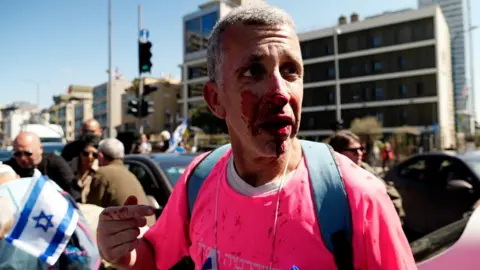 BBC
BBCThe beachside highway beside the British embassy in Tel Aviv descended into a scene of bitter division between Israelis a week ago, and blood was spilled on the tarmac.
The crowd started to block traffic - by now a frequent tactic of protesters - when a driver attacked one of the demonstrators.
They respond by subduing the driver, beating him back with an Israeli flag pole.
It was week 11 of mass anti-government protests, ahead of a trip to the UK today by Prime Minister Benjamin Netanyahu.
"Look at what [the driver] did... he hit me with the [oil] can," protester Shay Noter, who suffered a broken nose and bloodied face, told the BBC.
"We have a dictator in Israel that is trying to make his people hate us. You tell your government, you tell your people. He is telling them all the time that we are the enemy."
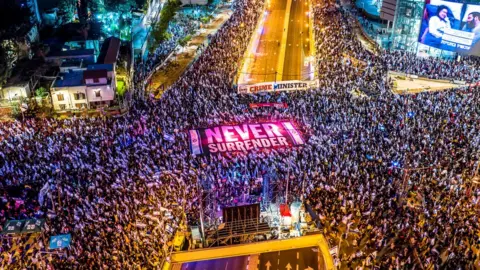 Reuters
ReutersPart of the demonstrations have been focused on embassies and the main airport, as Mr Netanyahu has paid a series of visits to European capitals amid growing political turmoil at home.
Protesters were on the streets again this Thursday, rallying against plans by his coalition of far-right and ultra-religious parties to limit the powers of Israel's courts.
Critics believe this will muzzle legal protections and open the door to an authoritarian, demagogic state. Mr Netanyahu says the changes will "rebalance" the branches of government.
The proposals would give ministers near full control over the committee which appoints judges and would ultimately strip the Supreme Court of crucial powers to strike down legislation.
"Our democracy is literally under attack by the government," said demonstrator Avinoam Brog.
"My parents' generation was part of the foundation of the country. Our generation was to protect it... Unfortunately, it's changed from protecting it against external enemies to an internal threat by our own government," he told the BBC.
His daughter, Nitzan Weisberg, said they were protesting against a "post-Zionist, messianic government".
"What were [we] fighting for? What were all the sacrifices made for?" she asked.
"My father and brothers didn't fight in wars for a theocracy, for Orthodox Jews, that would persecute LGBT [people], that would discriminate against women, that would persecute Arabs," she continued.
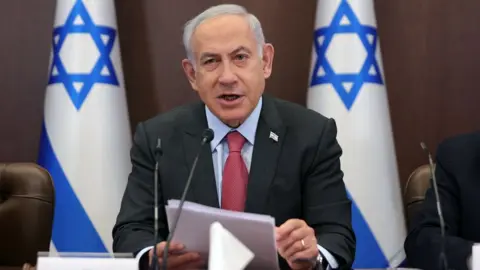 EPA
EPAMr Netanyahu is travelling to London on Thursday evening for talks on trade and security.
He is due to meet British Prime Minister Rishi Sunak for discussions billed by the Israelis as focusing on Iran and "strategic ties" with the UK.
The Israeli leader is expected to repeat his message that the highly controversial judicial reforms are necessary and that the country will "remain a liberal democracy".
After his election win, he argues, the changes are the will of the people that should not be thwarted by unelected judges.
He has previously denied that minority rights would be affected by his far right coalition partners, saying he has "both hands on the steering wheel".
And speaking ahead of his cabinet meeting on Sunday he said his government would not accept "anarchy".
"There are those who are calling for the blocking of highways, for military refusal, for blood in the streets, and to attack public figures. We will not accept this. We will not accept violence by any side," he said.
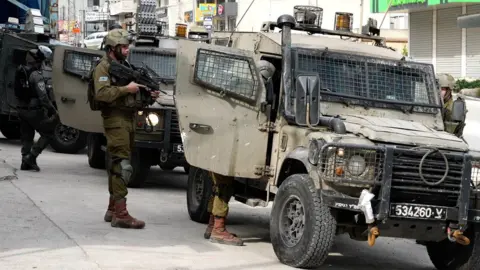
But there is growing international pressure on his government, which includes parties that espouse racist, anti-Arab policies, over both its legislation and rhetoric at a time when violence continues to spiral in the region.
Israel's far-right Finance Minister, Bezalel Smotrich, sparked a diplomatic crisis this week when he said there was "no such thing" as a Palestinian people, speaking in front of a map which put the occupied West Bank and neighbouring Jordan within Israel's borders.
Earlier this month, he called for the Palestinian town of Hawara to be "wiped out" after a Palestinian gun attack killed two Israelis, which in turn sparked a deadly rampage by Israeli settlers against Palestinian civilians and their homes.
Under pressure, Mr Smotrich later said he didn't mean it.
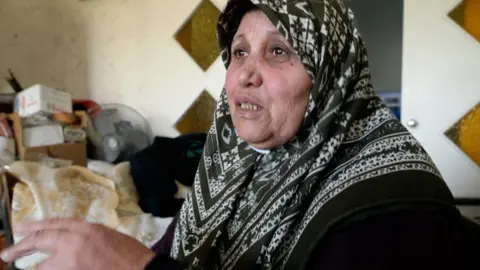
In the occupied West Bank, the protests feel a world away amid Israeli military outposts and growing numbers of army patrols.
Homes in Hawara still bear the scars of violence, with burned out buildings and vandalised shopfronts yet to be repaired.
Nawal al-Dumaidi, 70, showed the BBC inside her apartment which overlooks the main highway.
She was trapped for three days after the settlers burned the building's entrance and still has several tear-gas and stun-grenade shells that she says the Israeli military fired at her terrace while the fire raged.
Now, her family fears a deteriorating atmosphere, with the settlers emboldened by their far-right allies in government.
"We are suffering all the time. Settlers descend from the mountain, burn olive trees and attack homes," said Mrs Dumaidi.
"I am afraid that they will occupy Hawara because of its strategic location on the main road," she added.
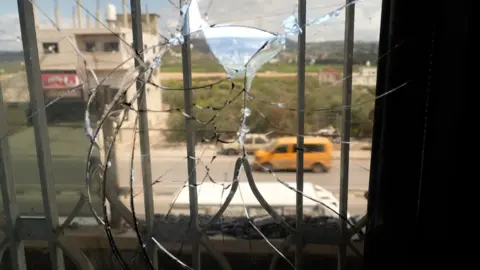
Her nephew, Jehad Shurab, talked about the weakness of the official Palestinian leadership, adding that "only God" can help the residents.
"The prime minister of Palestine came here. While he was here, the IDF [Israeli army] is down there [on the road]," he said.
He believes that Mr Smotrich and Israel's far-right National Security Minister, Itamar Ben-Gvir, are helping create an atmosphere of chaos.
"Ben-Gvir, Smotrich, they are crazy. And you see what's happening in Israel now... The international community must put an end to such behaviour of teenage Israeli politicians. The European Union, America, and the countries of the world must limit the dictatorial behaviour of these people," he says.
In the nearby cities of Jenin and Nablus, there are no signs of progress in US-backed attempts to restore the limited security grip of the Palestinian Authority (PA) - the official leadership rejected by a new generation of armed militants whose firepower has grown dramatically over the last 18 months.
In the most deadly start to a year in nearly two decades, Israeli military raids have become increasingly lethal, alongside a continuing wave of Palestinian armed attacks. At least 88 Palestinians and 15 Israelis have been killed since the beginning of January.
A tense period is expected in the coming weeks as hundreds of thousands of worshippers flock to Jerusalem with the Jewish holiday of Passover due to overlap with the Muslim holy month of Ramadan, which starts here on Thursday.
